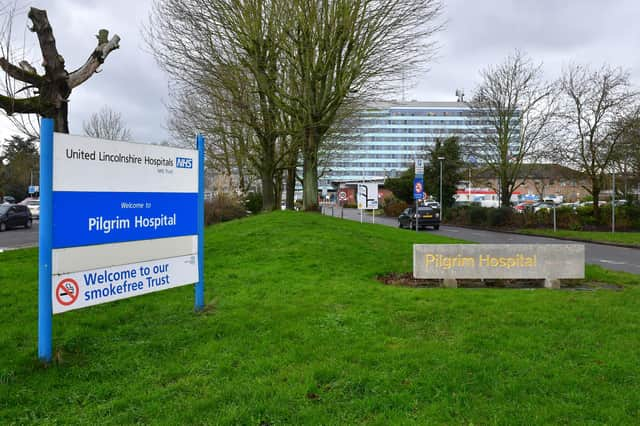Pilgrim Hospital whistleblower shares concerns about A&E and the loss of ward


The staff member, who asked to remain anonymous, contacted Lincolnshire World about the relocation of acute stroke services to Lincoln and her concerns over the situation with A&E, claiming some patients are waiting almost 40 hours for a bed.
Speaking about the planned closure of the stroke ward, she said: “They say that this is as a result of the consultation with the public regarding centralising stroke services at Pilgrim.
Advertisement
Advertisement
“Staff there have been told they have to reapply for jobs in another area.”
She said the plans will see the stroke ward shut with the loss of several beds, adding: “They are highly sought-after medical beds that the people of Boston are losing. This means the delays in A&E are only going to get worse.”
A spokesperson for United Lincolnshire Hospital NHS Trust (ULHT) which runs Pilgrim, confirmed that 24 hospital beds would be going as a result of the stroke ward closure.
The Standard asked ULHT if there were any plans to re-purpose the ward and the 24 beds, and were told there were not.
Advertisement
Advertisement
A ULHT spokesperson said: “For a long while now stroke patients have been sent to Lincoln, with the majority of stroke beds at Pilgrim being used by patients repatriated from other hospitals. The ward at Pilgrim is now closed which was always planned to happen as part of the consultation.”
Expressing concern over the affect the loss of hospital beds at Pilgrim may have on an already stretched system, the nurse went on: “The public need to be made aware what the trust is doing and how this is going to have a massive impact on them,” she said. “Lincoln will only get seven extra stroke beds. Yet most days there are over 20 stroke patients on wards which cannot meet their needs.”
She also criticised the wider care system, policies relating to homeless people, delays in discharging obese patients and A&E being “abused”. She claims many who end up at Pilgrim A&E are only there because they cannot get an appointment to see their GP and are admitted due to a fear of legal action.
“So people are admitted to hospital for things that could be dealt with in the community,” she said. “The lack of social care on the outside means there is always at least a ward full of medically fit patients sat stewing in beds that are needed, but we can’t get them out. Some then go on to develop pneumonia and decondition, meaning the once independent patient that came in with a bit of a UTI (urinary tract infection) has now landed up in hospital for weeks on antibiotic fluid and now needs care at home because they lost their independence being stuck in hospital.”
Advertisement
Advertisement
She said this resulted in blocking a bed that a person in A&E may have waited “nearly 40 hours” for.
Pointing to a particularly busy day at A&E, on Thursday, October 12, she adds: “By 8am on this morning there were 92 patients in A&E. Years ago, before Covid, if we had someone breach four hours that was bad. Now we would be happy if they were sorted within four hours because now it seems more like 40 is the norm. I don’t think the public actually appreciate that.
“With regards to the pressures on A&E I think a lot of it stems from the fact that GP surgeries are not operating to their full potential,” she said. “Patients often can’t get appointments, so they come here instead. Or when they do see a GP they send them to A&E for things that could easily be dealt with there. Or they go to urgent care and urgent care send them to A&E.”
She said: “The last few months, I’ve had quite a few [patients] with no fixed abode. But we are not allowed to discharge them back onto the street, so instead they stay here awaiting housing. Care packages and care homes also take too long to get people out of hospital.”
Advertisement
Advertisement
She also claims that with bariatric (obese) patients, 48 hours notice needs to be given to ambulance dispatchers before they can be taken home. “This means some patients end up in hospital for an extra two days,” she said. “There are so so many things that contribute, but one thing is for certain - A&E is abused. It’s used incorrectly.”
Responding to the nurse’s concerns, a ULHT spokesperson said: “Following a public consultation, plans were developed to expand the current provision for stroke patients at Lincoln County Hospital, with support from an enhanced community stroke rehabilitation team, and to close the stroke beds at Pilgrim Hospital with the outpatient provision remaining. From September 4, all new patients suffering a stroke and needing acute specialist care, including acute rehabilitation, have been taken to Lincoln County Hospital.
"Across the system in Lincolnshire, work is under way to make sure people receive the right care in the right place. And at Pilgrim Hospital this includes a programme to change the internal configuration of hospital beds with the aim of managing patient flow more effectively and reducing long waits in our emergency departments. Work is also progressing on a £43.5 million transformation project at Pilgrim Hospital to double the size of the existing emergency department.
“All of our A&Es have been busy in recent months in common with pressures experienced across the country. In spite of this, we continually manage our urgent care services to ensure that the safest care is consistently delivered to our patients who need it.
Advertisement
Advertisement
"Our message to the public is that if you need help and it’s not a 999 emergency, we ask you to consider if you can be helped by your GP or local pharmacy, or visiting NHS 111 online for clinical advice, assessment and for direction to the most appropriate services for your treatment.”